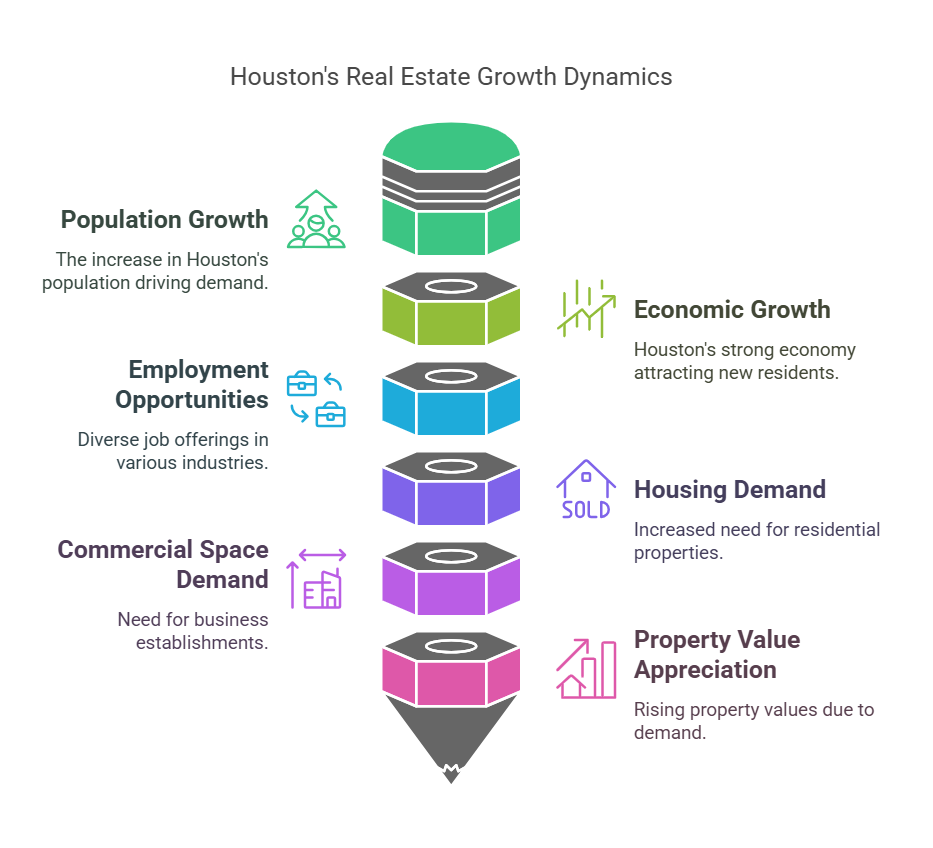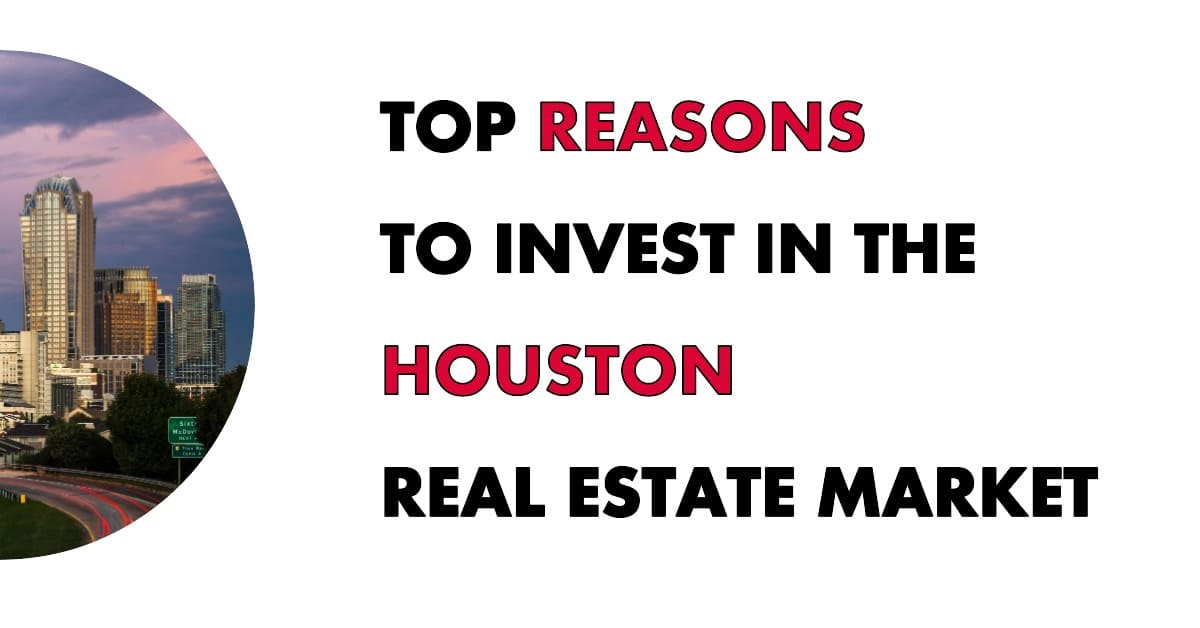In this article, we will look at the top reasons that make Houston a good place for real estate investment. It's no longer an unknown thing for a savvy real estate investor to know that Houston, Texas is a beautiful place to live and raise a family. Houston, with a fascinating history, is considered to be one of the most desirable locations to invest in real estate in the country and the whole world at large.
The Houston real estate market has been one of the favorite destinations for those looking for a beautiful home. In case you are thinking about investing in Houston real estate, as an investor, it is only logical to consider the booming cities in the country.
As someone who is looking to invest in real estate, I will advise you to consider investing in the Houston real estate market because this city is one of the good examples of a booming housing market. It provides a healthy and secure real estate profile for local and even foreign investors.
Houston has everything: the people, the diversity, the business climate, and a world-renowned in energy, medicine, space, and manufacturing. So, if you are of one the investors looking to invest in the Houston housing market, then you are on the right track as a savvy investor. The Houston housing market offers plenty of choices and amazing prices for properties and it is a good time to invest in Houston.
Table of Contents
Top Reasons To Invest In The Houston Real Estate Market

1. Population Growth
Population growth is a significant factor to consider when evaluating real estate investment opportunities. In the case of Houston, Texas, a burgeoning population can indeed be seen as a compelling reason to invest in its real estate market.
**Houston** has experienced substantial population growth over the years, positioning itself as one of the fastest-growing cities in the United States. According to the latest available data, the population of Houston was approximately 2.31 million in 2020, showcasing an increase from previous years.
The city's strong economic growth and diverse employment opportunities play a pivotal role in attracting people to Houston. It is a hub for various industries, including energy, healthcare, aerospace, and technology, providing a broad spectrum of jobs for residents.
With a growing population, there is a heightened demand for housing and commercial spaces. The influx of new residents creates a need for housing units, rental properties, and commercial establishments, contributing to a vibrant real estate market.
As demand for real estate rises due to population growth, property values tend to appreciate. Investing in Houston real estate now could potentially yield long-term financial gains as property values increase over time, driven by a growing population.
2. Strong Economy and Job Growth: A Catalyst for Real Estate Investment
The strong economy and consistent job growth in Houston, Texas, present compelling reasons to consider investing in the city's real estate market. Let's delve into the facts and statistics that support this assertion.
**Houston** boasts a robust and diverse economy, making it a prime location for potential real estate investments. The city is a major player in sectors such as energy, healthcare, aerospace, manufacturing, and technology. Its strategic geographic location, business-friendly environment, and international trade contribute significantly to its economic vitality.
**Houston** has been consistently generating new job opportunities. According to recent data, the city has experienced a steady job growth rate. In 2020, the unemployment rate was approximately 8.1%, which is a competitive figure considering the challenges posed by the COVID-19 pandemic. The city's diverse job market attracts professionals from various fields.
The correlation between a strong economy, job growth, and the demand for real estate is evident. A flourishing economy and a plethora of job opportunities translate into an increased demand for residential, commercial, and industrial properties. Houston's real estate market has witnessed a surge in demand, resulting in a promising environment for investors.
Historical data indicates that areas with a strong economy and consistent job growth tend to experience property appreciation. Investing in Houston's real estate market at a time when the economy is thriving can potentially lead to favorable returns on investment as property values rise over time.
The local government's commitment to infrastructure development further amplifies the city's appeal for real estate investment. Investments in public infrastructure enhance the overall value of properties and contribute to the growth of various neighborhoods.
3. Education and Quality of Life
The quality of education and the overall quality of life are critical factors influencing the attractiveness of a location for real estate investment. Let's explore how these elements contribute to the investment potential in Houston, Texas.
**Houston** is home to several esteemed educational institutions at various levels, including universities, colleges, and schools. It boasts renowned universities like Rice University and the University of Houston, which are not only academically reputable but also attract a considerable number of students, faculty, and staff to the city.
The presence of esteemed educational institutions often leads to an increased demand for student housing and properties in close proximity to these campuses. Investors can leverage this demand to create attractive rental opportunities and potential long-term property appreciation.
A strong educational system contributes to an enhanced quality of life for residents. Access to quality education improves overall community well-being, attracting families and professionals seeking a conducive environment to raise children and further their careers.
The demand for housing near educational institutions often creates steady demand in specific neighborhoods. This sustained demand can provide investors with a reliable and consistent rental income stream, contributing to a stable investment portfolio.
Areas with educational institutions tend to have enhanced community amenities and infrastructure to cater to the needs of students and faculty. These amenities, including parks, shopping centers, and cultural venues, can significantly boost the overall appeal of the neighborhood for potential tenants and buyers.
4. International Trade and its Influence on Houston Real Estate Investment
International trade plays a crucial role in shaping the economy of a city, and Houston, Texas, stands as a testament to this. Let's delve into how Houston's position in international trade can impact real estate investment in the city.
**Houston** holds a prominent position as a major trading hub, not just within the United States but on a global scale. The city's strategic location near the Gulf of Mexico and its well-established infrastructure contribute to its role as a gateway for international trade.
The robust international trade activities in Houston significantly contribute to its economic growth. The trade encompasses various industries, including oil and gas, manufacturing, aerospace, healthcare, and technology, boosting the demand for commercial real estate, warehouses, and distribution centers.
The bustling international trade activities fuel real estate demand in the city. Investors can capitalize on this demand by focusing on commercial properties, especially those linked to the logistics and distribution sector, given the need for storage and transportation facilities associated with international trade.
The thriving international trade scene in Houston creates employment opportunities, attracting a diverse workforce. As people migrate to Houston for work, there is an increased demand for housing and other real estate properties, contributing to population growth and creating investment opportunities.
The local government, recognizing the importance of international trade, often invests in infrastructure development to support and enhance trade operations. These initiatives can positively impact the real estate market by increasing the value of properties in areas crucial for trade activities.
5. Forecast for the Houston Housing Market (2025)
The Houston housing market in 2025 is expected to remain dynamic, with a mix of opportunities and challenges for buyers, sellers, and investors. While the market has shown resilience, it is undergoing a transition from the high-demand, low-supply conditions of previous years to a more balanced environment. Below is an updated analysis based on the latest data and trends.
- Moderate Price Growth: Home prices in Houston are expected to grow modestly, with forecasts suggesting a 2% to 3% annual increase in median home prices. As of December 2024, the median home price was approximately $337,000, reflecting a 3.6% increase from the previous year. However, some neighborhoods, such as The Heights and Sugar Land, continue to see higher price appreciation due to their desirability.
- Increased Inventory: Housing inventory in Houston has risen significantly, reaching a 4.4-month supply as of November 2024, up from 3.5 months in 2023. This increase provides buyers with more options and reduces the intense competition seen in previous years.
- Slower Sales Pace: Homes are staying on the market longer, with the average days on market (DOM) increasing to 52 days in November 2024, up from 48 days the previous year. This indicates a more balanced market, giving buyers more time to make decisions.
- Luxury Market Strength: The luxury segment continues to thrive, with homes priced over $1 million experiencing a 21.4% increase in sales in November 2024. Wealthier neighborhoods like River Oaks and The Woodlands remain highly sought after.
- Suburban Appeal: Suburban areas such as Katy, Cypress, and Sugar Land are expected to dominate buyer preferences due to their affordability, larger homes, and access to quality schools. These areas are also seeing significant new construction, further boosting their appeal.
Factors Affecting the Houston Housing Market in 2025
- Interest Rates: Mortgage rates are expected to remain elevated, hovering around 6.5% for a 30-year fixed mortgage. While this is higher than the historic lows of recent years, it is unlikely to deter all buyers, especially cash buyers who account for over 30% of transactions.
- Economic Conditions: Houston's diverse economy, driven by sectors like energy, healthcare, and technology, continues to attract new residents and support housing demand. The city is projected to add over 75,000 new jobs in 2025, further fueling demand for housing.
- Affordability Challenges: Rising home prices and elevated mortgage rates are making it difficult for first-time buyers to enter the market. This has led to increased demand for rental properties, with the rental market showing low vacancy rates and rising rents.
- New Construction: New housing developments are struggling to keep pace with demand, particularly in the affordable segment. Builders face challenges such as rising material costs and labor shortages, which limit the supply of new homes.
- Market Segmentation: The market is showing varied performance across different property types. While single-family homes are seeing steady growth, the townhouse and condominium market has experienced declines in both sales and prices.
Forecast for 2025
- Home Prices: Median home prices are expected to increase by 2% to 3%, reaching approximately $344,000 by the end of 2025.
- Inventory Levels: Inventory is projected to continue rising, potentially reaching a 4.5-month supply, the highest in eight years.
- Buyer-Friendly Conditions: With more inventory and slower sales, buyers will have greater negotiating power and more time to make decisions.
- Luxury Market: High-end properties will continue to perform well, driven by demand from cash buyers and well-qualified borrowers.
5 Areas to Invest in the Houston Real Estate Market
When considering real estate investment in Houston, it's essential to assess various neighborhoods and areas to identify the most promising opportunities. Here are the top five areas to consider for real estate investment in Houston:
1. The Woodlands
The Woodlands is a sought-after area known for its upscale housing options, excellent schools, and a well-planned community. It offers a mix of single-family homes, condos, and townhouses. The area's proximity to major highways and its focus on sustainable development make it an attractive choice for real estate investment.
2. Montrose
Montrose is a vibrant neighborhood with a diverse cultural scene, historic charm, and a strong sense of community. It's popular for its eclectic real estate options, including historic homes, modern apartments, and trendy condos. The neighborhood's walkability and access to parks, restaurants, and shops make it an enticing investment opportunity.
3. Katy
Katy, located to the west of Houston, has been experiencing significant growth due to its top-rated schools, family-friendly environment, and a variety of housing options. It offers a mix of single-family homes, townhouses, and new developments, attracting both families and professionals looking for a well-rounded community.
4. Midtown
Midtown is a bustling neighborhood known for its urban lifestyle, diverse population, and an array of dining and entertainment options. It has seen considerable real estate development in recent years, with a focus on condominiums, lofts, and townhomes. Its proximity to downtown Houston adds to its appeal to potential investors.
5. Spring Branch
Spring Branch is a neighborhood undergoing rapid revitalization and growth. It offers a mix of older homes and new construction, making it attractive for a wide range of investors. The area's proximity to major highways, shopping centers, and quality schools makes it an up-and-coming real estate investment destination.
These areas represent a mix of established neighborhoods and emerging ones, each with unique features and potential for real estate investment. It's advisable to conduct thorough research, consider your investment goals, and seek guidance from a local real estate expert to make informed investment decisions in the Houston real estate market.
Investment Advice for Investors:
- Start early: The earlier you start investing, the more time your money has to grow. This is because of the power of compounding, which is when your earnings start earning interest.
- Invest regularly: Even if you can only invest a small amount of money each month, it will add up over time. This is called dollar-cost averaging, and it can help you reduce your risk by buying more shares when prices are low and fewer shares when prices are high.
- Diversify your portfolio: Don't put all your eggs in one basket. Spread your money across different asset classes, such as stocks, bonds, and real estate. This will help to reduce your risk if one asset class underperforms.
- Rebalance your portfolio regularly: As your investments grow and change, you will need to rebalance your portfolio to make sure that it still meets your risk tolerance and investment goals. This means selling some of your winners and buying more of your losers.
- Don't panic sell: It's normal for the stock market to fluctuate. Don't sell your investments just because the market is down. Instead, stick to your long-term investment plan.
Additional Tips for Investors:
- Do your research: Before you invest in anything, make sure you understand the risks and rewards involved. Read the prospectus and other financial documents carefully.
- Don't try to time the market: It's impossible to predict when the market will go up or down. Instead, focus on investing for the long term.
- Have a plan: What are your investment goals? How much time do you have to reach those goals? What is your risk tolerance? Once you have a plan, you can start to choose the right investments for you.
- Don't be afraid to ask for help: If you need help investing, talk to a financial advisor. They can help you create a financial plan, choose the right investments, and rebalance your portfolio regularly.
Work with Norada in 2025, Your Trusted Source for
Real Estate Investing in “HOUSTON”
Discover high-quality, ready-to-rent properties designed to deliver consistent returns.
Contact us today to expand your real estate portfolio with confidence.
Contact our investment counselors (No Obligation):
(800) 611-3060
Read More:
- Houston Housing Market: Trends and Forecast 2025-2026
- Houston Real Estate Market Forecast 2025-2026: What to Expect
- 17 Facts That Make Houston the Best City in America
- Best Houston Neighborhoods to Buy Investment Properties in 2025
- Housing Market Trends: Big Investors Buy in Atlanta, Dallas, Charlotte, Houston
- Is Texas a Good Place to Live: Explore the Cost, Jobs and Lifestyle




